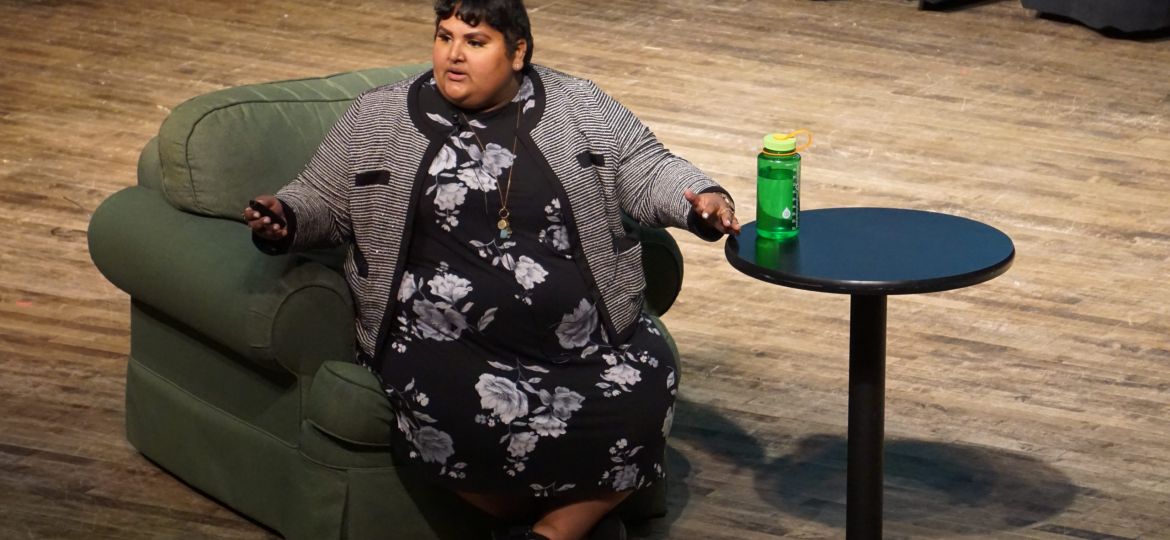
St. Olaf Students for Reproductive Rights (SRR), in collaboration with the Women’s and Gender Studies Department, the Taylor Center for Equity and Inclusion, the Wellness Center and other organizations, hosted a keynote speech by Sonalee Rashatwar in the Pause on April 18.
Alisha Chaudhry ’19, co-chair of SRR, said they had to get creative with the funding to bring Rashatwar to campus. Earlier this semester, SRR tabled to sell buttons and stickers outside of Stav Hall to raise the money.
“As a reproductive rights club, we always strive to make sure we are supporting the reproductive justice movement,” Chaudhry wrote in an email. “Sonalee’s work clearly epitomizes what it means to do reproductive justice work, as she moves beyond only looking at abortion, birth control, etc., in order to examine all the ways individuals and communities are prevented from raising their families fully.”
Rashatwar said they are a fat, queer, non-binary therapist who works as a sexual violence crisis counselor. Throughout the talk they tackled body image and racial identity issues by characterizing race as a body image issue and fighting the politicization of the human body.
“Diet culture sells us this binary of good and bad. There is no good or bad food – all food has nutritional value.” – Sonalee Rashatwar
“Tonight we’re going to talk a little bit about how body positivity often gets pigeonholed into this conversation about self-love,” Rashatwar said. “Radical fat liberation is rooted in disability justice and this idea that all bodies have inherit value.”
Rashatwar discussed how the work they focus on now, through grassroots education, talks about what internalized fatphobia looks and feels like.
“It’s this denial of pleasure or denial to take up space,” Rashatwar said. “There’s this idea that we should constantly be working to make ourselves smaller and take up less space in the world.”
Before diving into the key points of their talk, Rashatwar sought to establish three main assumptions with the audience: that de-colonization is not a metaphor and we are all living on stolen land, that covert white supremacy – including microaggressions – coddles white fragility in our society and that intersectionality exists and people experience discrimination across different identities.
“When we look at people who exist at the axis of multiple oppressions, I want us to not think of those oppressions as a three plus three equation, but I want us to see it as a three multiplied by three equation,” Rashatwar said.
Rashatwar emphasized audience participation and, through a thought experiment asking everyone to brainstorm issues surrounding reproductive justice in America, aimed to uncover how most people center social justice issues around the mainstream identity of the white American.
“Our understanding of social issues is centered around white supremacy,” Rashatwar said. “When we’re thinking of issues that primarily affect white folks and universalizing it to everyone else instead of centering the issue around marginalized communities.”
Rashatwar believes that centering the narrative of social justice around marginalized communities would completely rewrite the story of how we as a society think about social issues.
In particular, Rashatwar thinks that body image conversations should be intentionally centered on marginalized people of color in order to think of the issue in a new light.
“When we think about body image from this white supremacist understanding of it, we get this really individualized experience of ourselves and the mirror,” Rashatwar said. “What we don’t think about is the way that on our bodies are mapped threats, especially for people of color.”
Seeing body image as a racialized issue highlights how much of an impact these coded targets on people’s bodies have on the way people are able to move throughout the world, Rashatwar emphasized.
The remainder of Rashatwar’s talk focused on fatphobia in the medical world, diet culture, body image abuse and the oppressive hierarchy of food that makes thinness and healthiness a class status marker.
“Diet culture sells us this binary of good and bad,” Rashatwar said. “There is no good or bad food – all food has nutritional value.”
Rashatwar hopes that the audience took away empowerment to tear down the binaries of food and fatness.
“There are not just two options of healthy and unhealthy, or with good and bad food or body type,” Rashatwar said. “There can exist something in between, and in fact, that’s what most of us fall within.”

